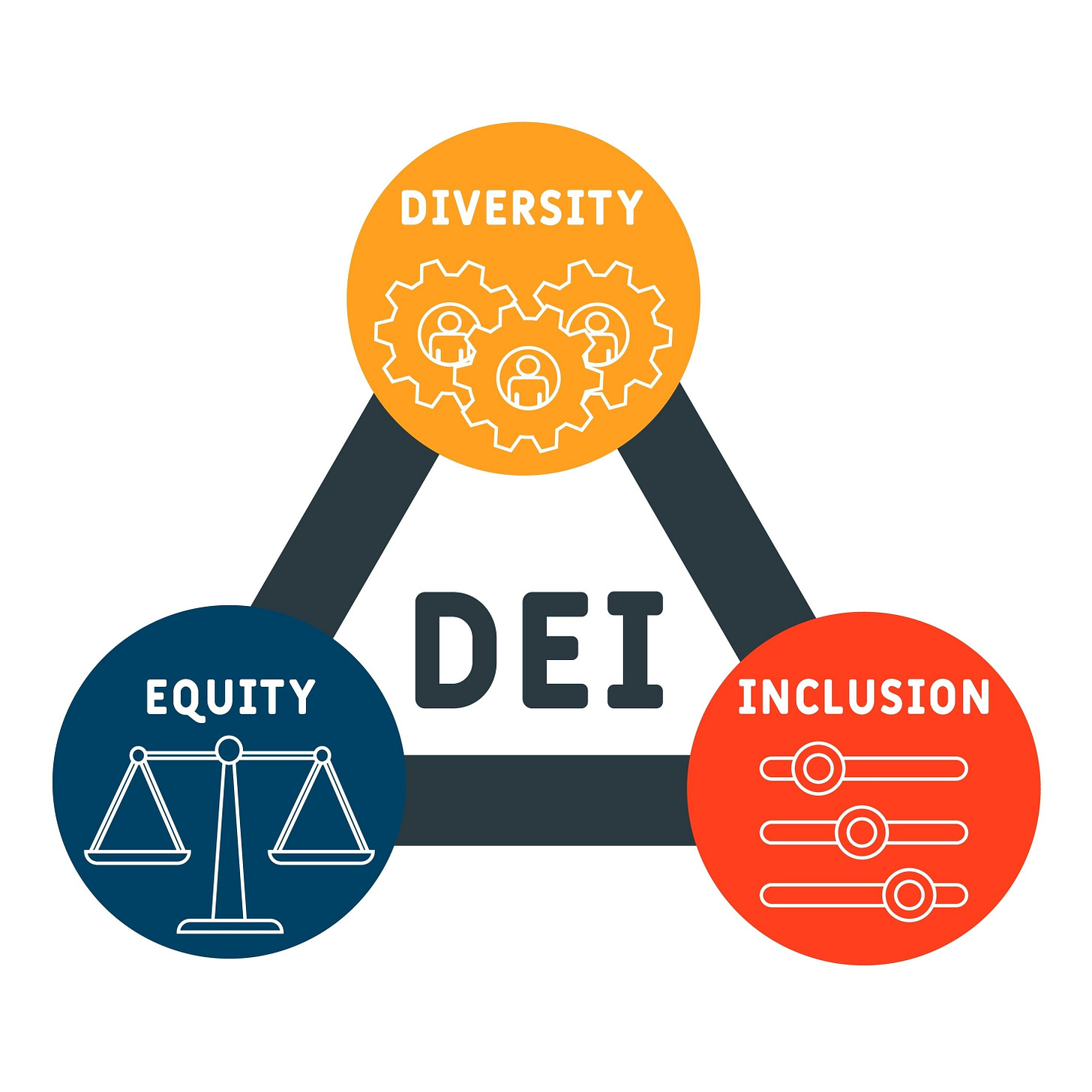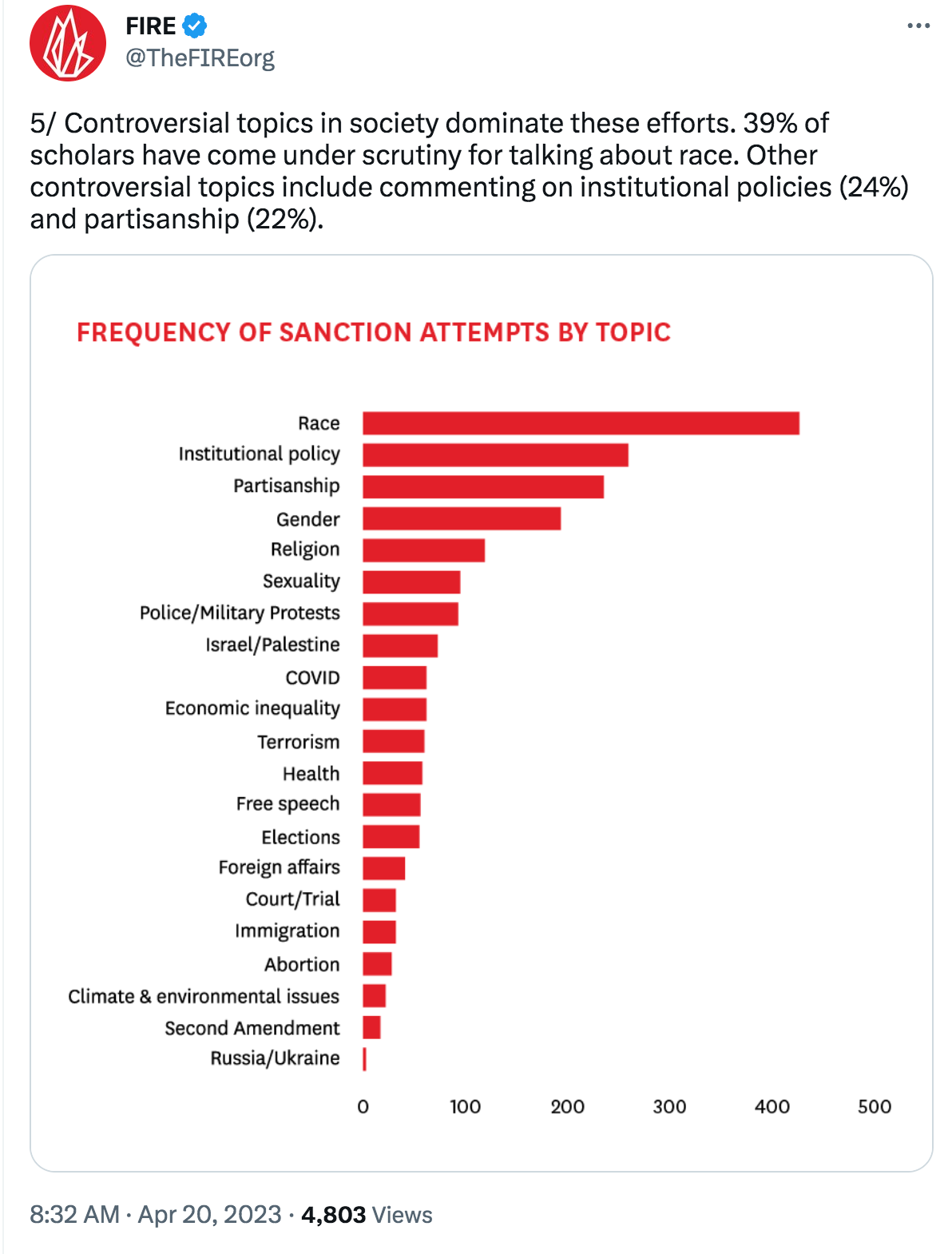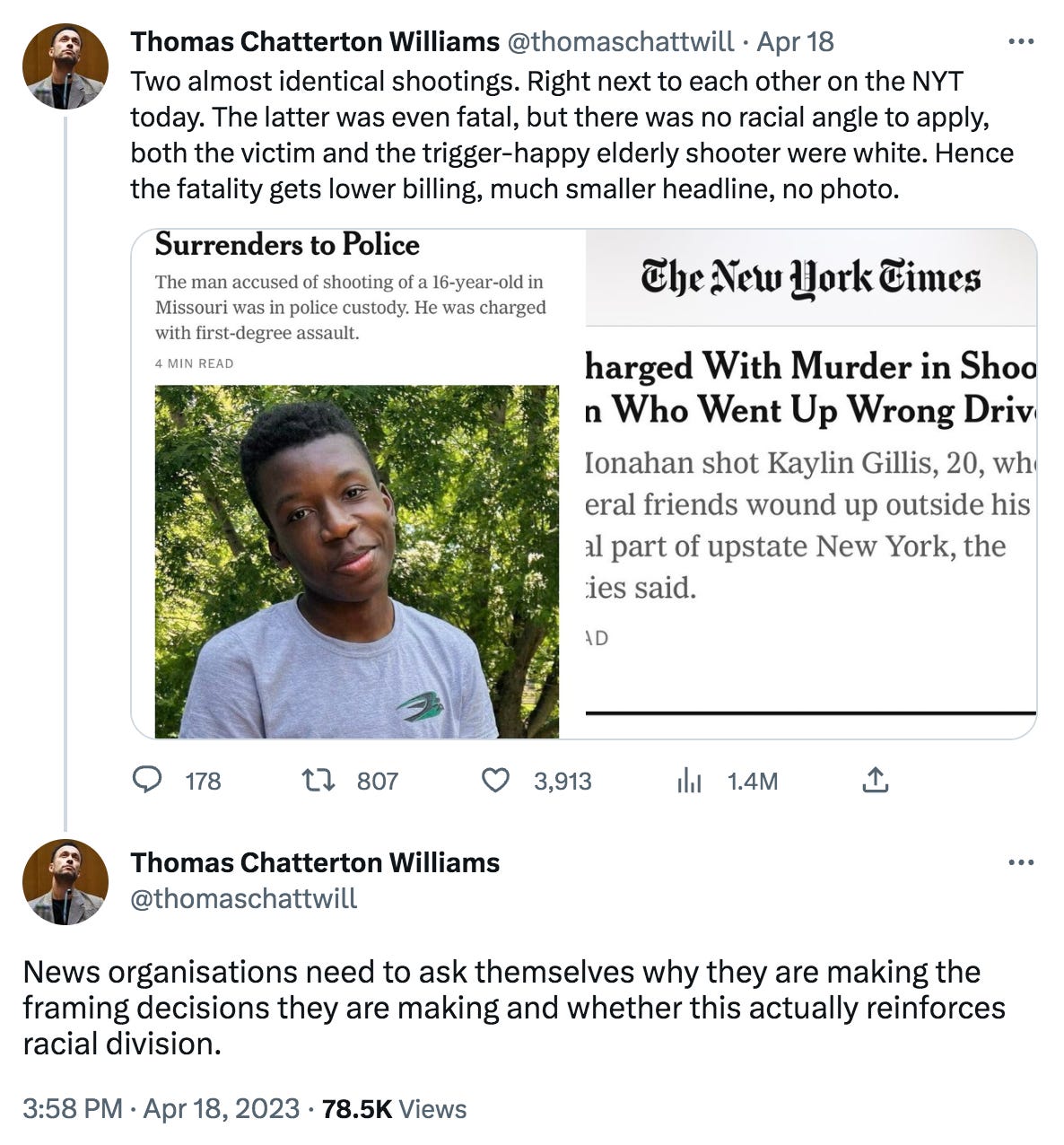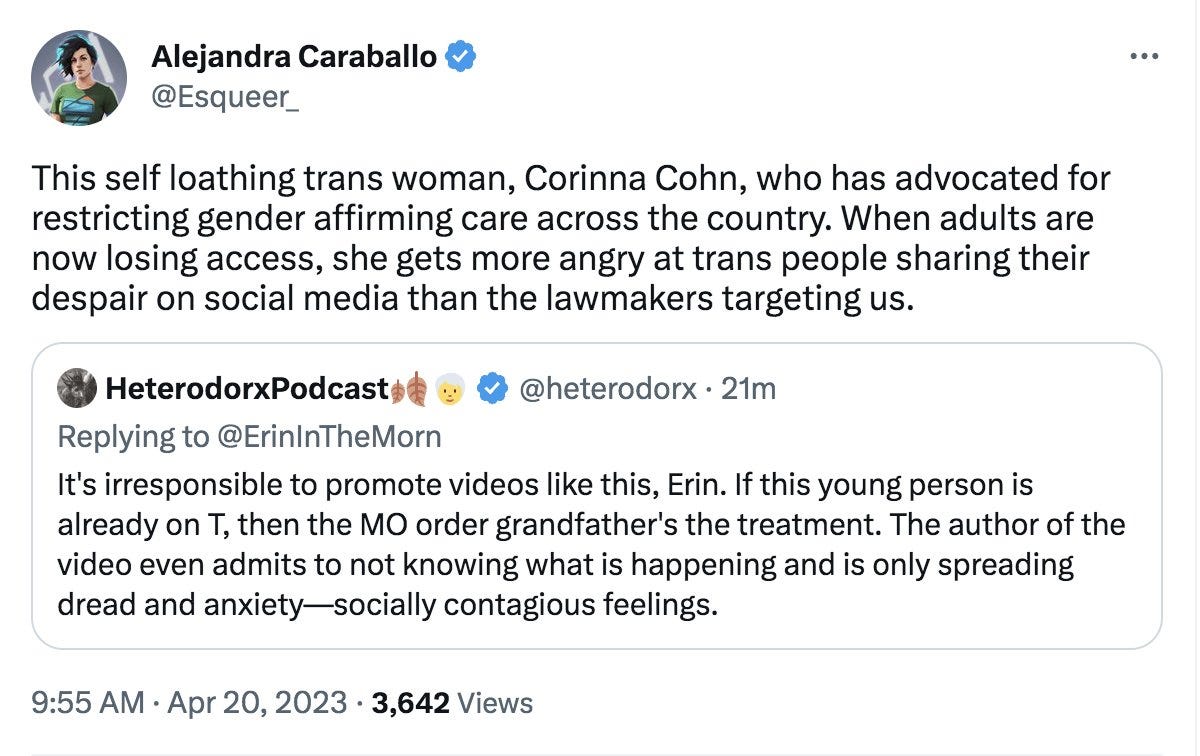E-Pluribus | April 20, 2023
The times, they are a-changing DEI; talking our way to a better future; and the government wants you to watch what you say about Chicago and crime.
A round-up of the latest and best writing and musings on the rise of illiberalism in the public discourse:
Kate Marijolovic: How Anti-DEI Bills Have Already Changed Higher Ed
After years of unimpeded progress, diversity, equity, and inclusion (DEI) programs at colleges and universities are finally facing pushback. Even in places where legislation hasn’t mandated it, Kate Marijolovic at the Chronicle of Higher Education reports that anti-DEI efforts are having an impact.
In March, all three of Iowa’s public universities were ordered by the Board of Regents, State of Iowa to put a hold on any new diversity, equity, and inclusion programs. The board will be studying all current diversity programs and hiring practices.
[ . . . ]
Press officers for the University of Northern Iowa, Iowa State University, and the University of Iowa were unaware of any new diversity policies or programs that have been paused following the board’s announcement.
[ . . . ]
The University of Texas system and the University of North Texas system have also put a stop to any new diversity, equity, and inclusion efforts.
The pauses came in response to a memo sent to state agencies by Gov. Greg Abbott of Texas, a Republican, which asserted that requiring diversity statements in hiring is against federal and state law. Requiring job applicants to submit a diversity statement is a common practice among higher-ed institutions.
[ . . . ]
Though the bills have not yet become law, the Texas A&M University system, the University of Houston system, and the University of Missouri system have all stopped using diversity statements in their hiring processes.
The University of Missouri system will now use a “values commitment” that prospective employees can respond to. The system also announced in March that it will no longer use a “diversity faculty hiring rubric.”
Read it all.
Erec Smith: Rhetoric Creates Opportunities for Abundance
“Sticks and stones may break my bones, but words can never hurt me.” Although the intention of the aphorism is to help children fend off hurt feelings, words can indeed hurt, but the good news is that they can help as well. At Discourse Magazine, Erec Smith writes that “appropriate methods of argumentation and persuasion” can foster “wisdom and community” and lead to a better society for all involved.
Thus, I agree with Gonzalo Schwarz when he writes that social mobility is “the economics of flourishing.” I define abundance as Schwarz defines flourishing; it goes beyond financial richness and “is also about achievement, purpose, aspiration, poverty reduction and developing the skills and personal characteristics necessary to thrive in our current economy.” This is an apt definition for abundance. “Understood this way,” Schwarz continues, “an abundance agenda is critical to increasing social mobility and enhancing human flourishing,” and I would argue that rhetoric is critical to an abundance agenda. Therefore, rhetoric is critical to human flourishing. The Black man who approached me in the bar felt like someone on the outside looking into a party he didn’t know how to enter. Rhetoric can be the way into that party—the key, or even the door itself—and the more rhetorical savvy a person has, the more there is potential for abundance.
Abundance, or the ability to acquire it, is in a sense foundational to rhetorical theory and practice. One can infer it from Aristotle’s traditional definition of rhetoric: “the faculty of observing in any given case the available means of persuasion” (emphasis mine). Means of persuasion are only “available” if one has enough awareness of the “given case” to make the best of them. To be skilled in rhetoric is to have an abundance of awareness and methods of expression, which, in turn, better ensure an abundance of achievements. Knowing a variety of ways to express the same thing can make possible a variety of circumstances that are unavailable to the person who only has one or two modes of expression. . .
[ . . . ]
Using rhetoric to identify with an audience can open doors that would otherwise remain shut. Speakers who reference the particular history an audience shares, or who use a local landmark as a metaphor to support their point, may attract more attentive and active listeners than they would by referencing their own hometown histories and landmarks. To be knowledgeable of what an audience values and believes, and to be savvy enough to incorporate those values and beliefs into speech, is to better ensure an abundance of opportunities and an abundance of angles from which to approach a topic. Rhetoric discovers opportunity in a given situation. This, in turn, may lead to an abundant life.
Rhetoric can also make doors already open remain open. Take, for instance, “narrative insurgency,” a concept activist Jonathan Smucker describes as the discovery and utilization of “points of connection—i.e., common ground between their belief system and yours.” Smucker uses an argument between a climate change activist and a creationist as an example: “When someone wraps climate change-denial views in the rhetoric of creationist beliefs, it is tempting to directly attack.” However, “narrative attack,” as opposed to narrative insurgency, may shut down conversation and shut the metaphorical door for either debater to change the other’s mind.
Read the whole thing.
John Berlau and Stone Washington: CFPB Tries to Censor Speech on Chicago Crime
The power of federal agencies to harass businesses for supposed regulatory infractions is nothing new, but John Berlau and Stone Washington write in the Wall Street Journal of a particularly egregious case. The Consumer Financial Protection Bureau (CFPB) is using statements on a company podcast regarding crime in Chicago to accuse the company of “discriminatory acts or practices” even though no specific instances against any customers or potential customers are cited.
The Consumer Financial Protection Bureau, a federal bureaucracy with a vast jurisdiction, is testing a novel approach to crime and punishment. In a lawsuit against Townstone Financial, a small Chicago-area nonbank mortgage firm, the CFPB is signaling that it may attempt to punish anyone who complains about neighborhood crime.
The CFPB accuses Townstone owner Barry Sturner and others affiliated with the company of making “statements that would discourage African-American prospective applicants from applying for mortgage loans.” The suit, filed in 2020, doesn’t provide any concrete examples of consumers that Townstone has allegedly mistreated. Rather, the CFPB points to a handful of statements Mr. Sturner and other company officials made over a four-year period on the Townstone Financial Show—a weekly radio program and podcast. These statements, according to the regulatory behemoth, discourage “prospective applicants, on the basis of race, from applying for credit.”
The CFPB’s action against Townstone is concerning for many reasons. Chief among them is the lawsuit’s blatant attempt to apply antidiscrimination laws to speech made to a general audience in a mass-media venue rather than to individual customers or employees in a workplace. The Pacific Legal Foundation, a public-interest law group representing Townstone, warns in a legal brief that this approach to enforcement “would arrogate to the CFPB the authority to censor speech.”
[ . . . ]
Among the statements highlighted in the lawsuit are Mr. Sturner’s descriptions of frequent weekend crime rampages on Chicago’s South Side as the work of “hoodlums” and his claim that police are keeping the city from “turning into a real war zone.” The CFPB also wags its finger at a host’s description of a Chicago suburb as an area in which “you drive very fast through” and “you don’t look at anybody or lock on anybody’s eyes.”
Read it all here.
Around Twitter
Some excerpts from a Foundation for Individual Rights & Expression (FIRE) thread on a new survey, Scholars Under Fire:
Thomas Chatterton Williams with some thoughts on two recent horrific shootings and how, in this case, the stories were framed by the New York Times:
And finally, Alejandra Caraballo of the Harvard Law Cyberlaw Clinic demonstrates that even identifying as trans won’t protect you if you stray from trans orthodoxy. As Jim Treacher noted, “They can tolerate anything but dissent.”












